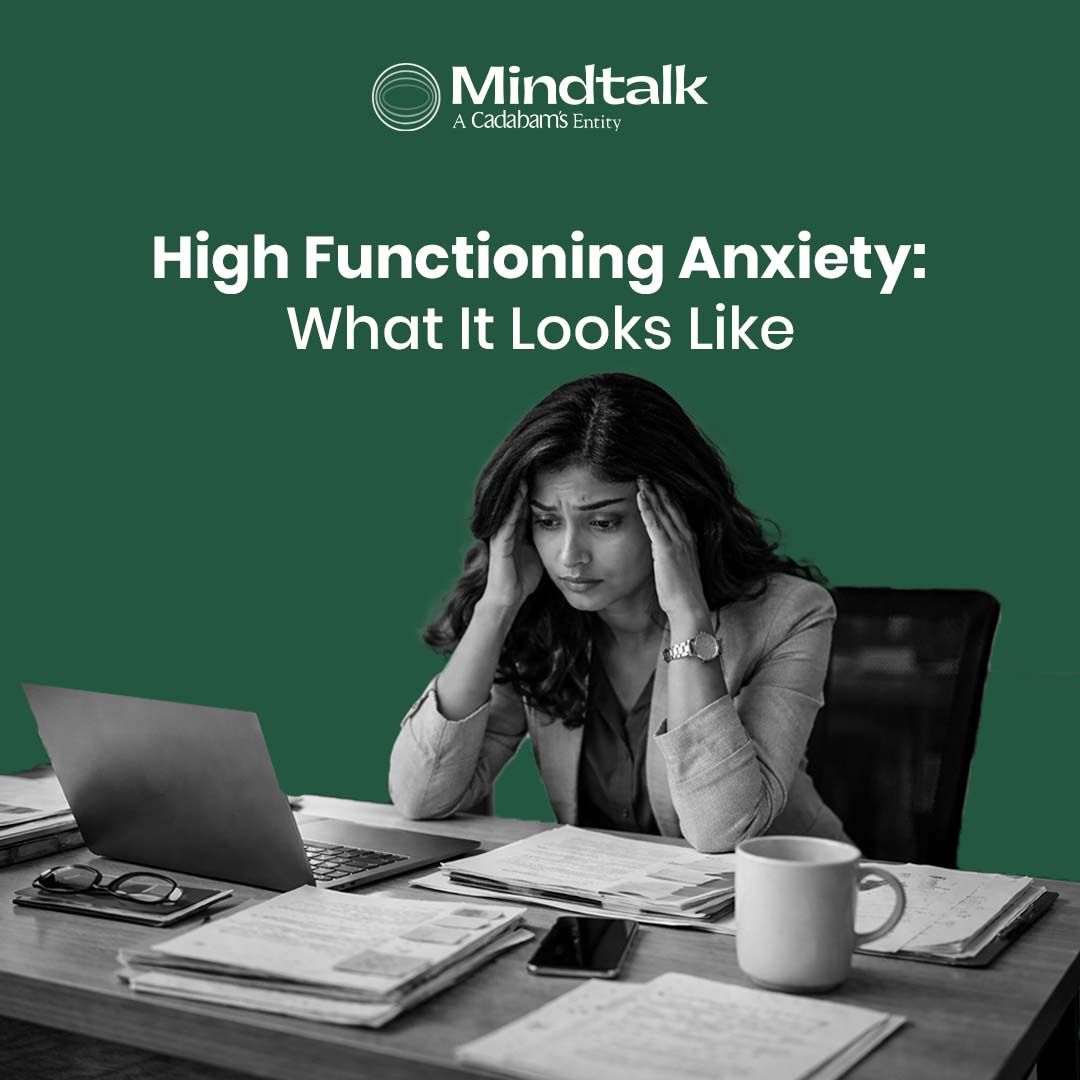Understanding and Managing High-Functioning Anxiety
People with high-functioning anxiety appear confident and successful on the outside, but they are emotionally tormented by excessive worry and self-doubt.
Despite their accomplishment, they fidget, overthink, and feel pressured. A better balance between productivity and mental wellness can be achieved by effectively managing the symptoms of high functioning anxiety, causes, and coping strategies.

What Is High-Functioning Anxiety?
Individuals who seem successful and calm on the outside but struggle with excessive worry, tension, and self-doubt on the inside are said to have high-functioning anxiety. They fear failure, strive for excellence, and frequently overachieve. Despite this, many delay seeking high functioning anxiety treatment, assuming they can manage without support.
In spite of their achievements, they could be restless, overthink things, and have trouble unwinding, which could affect their emotional stability and general mental health.

Definition and Overview
High-functioning anxiety is a psychological state in which a person struggles with persistent anxiety but appears to lead a successful life. They tend to be confident, well-organised, and efficient, but, deep down, have too much worry, self-doubt, and fear of failure. High-functioning anxiety is not a clinical condition, but can still have a serious impact on an individual's life.
How It Differs from Generalised Anxiety Disorder (GAD)
Unlike Generalised Anxiety Disorder (GAD), where symptoms disrupt daily life, high-functioning anxiety enables individuals to excel despite their struggles.
People with GAD may visibly struggle with anxiety, while those with high-functioning anxiety often hide their worries behind productivity. The pressure to perform well masks their internal battles, making diagnosis and high functioning anxiety treatment more difficult.

Common Misconceptions
It is a popular myth that high-functioning anxiety is helpful because it promotes attainment. It may complicate mental illnesses, emotional burnout, and burnout.
Another misconception is that people who have it don't require help. They truly need support and coping mechanisms to manage their ongoing stress and anxiety.
Signs and Symptoms
Overthinking, excessive worry, perfectionism, and trouble saying no are all symptoms of high functioning anxiety. Although they appear successful, they struggle with self-doubt, fear of failing, and a lack of relaxation or present-moment enjoyment. The right high functioning anxiety treatment can quietly transform daily overwhelm into calm focus.
Emotional Symptoms (Perfectionism, Overthinking, Fear of Failure)
Individuals with high-functioning anxiety often set unrealistic standards, constantly fear failure, and overanalyse decisions. Perfectionism pushes them to achieve more but creates anxiety over mistakes.
Overthinking everyday situations, replaying past conversations, and worrying about the future are common patterns that keep them mentally exhausted and anxious, and if left unmanaged, may evolve into high functioning anxiety and depression.
Physical Symptoms (Tense Muscles, Restlessness, Insomnia)
Physical signs of high-functioning anxiety include persistent muscle tension, fidgeting, and an inability to relax. Insomnia is standard, as overthinking and worry prevent restful sleep. Some may experience headaches, digestive issues, or chronic fatigue, all resulting from prolonged stress and the body's heightened response to anxiety. These symptoms of high functioning anxiety are often overlooked.
Behavioural Signs (Workaholism, Overcommitment, People-Pleasing)
People with high-functioning anxiety often struggle with saying no, leading to over-commitment. They may become workaholics, taking on excessive responsibilities to validate their worth. People-pleasing behaviour stems from a fear of disappointing others, which prioritises others' needs over their own, often at the cost of personal well-being.
Hidden Struggles (Imposter Syndrome, Fear of Disappointing Others)
In spite of success, high-functioning anxiety individuals tend to experience the imposter syndrome, questioning their skills and anticipating being caught out as a fake. They continually search for reassurance and confirmation. Dread of failing others is all-consuming, and a self-dictated burden lies in performing at high levels and projecting competence.
Causes and Risk Factors
People with high-functioning anxiety appear confident and thriving on the outside, but they are emotionally tormented by excessive worry and self-doubt. Despite their accomplishment, they fidget, overthink, and feel pressured.
A better balance between productivity and mental wellness can be achieved by effectively managing the symptoms, causes, and coping strategies.
Genetic & Biological Factors
High-functioning anxiety may be linked to genetic predispositions and brain chemistry. Individuals with a family history of anxiety disorders are more likely to develop symptoms.
Neurotransmitter imbalances, particularly in serotonin and dopamine, contribute to heightened anxiety responses, making some people more prone to excessive worrying and stress. These factors need to be considered for proper high functioning anxiety medication.
Personality Traits (Type A, Perfectionism)
High-functioning anxiety is more common in people with type A personalities who are driven, competitive, and tense. Chronic tension is the result of perfectionists' constant strain to create flawless results. They become stuck in a never-ending cycle of work, self-blame, and second-guessing because they are afraid of making a mistake.
Childhood Experiences & Parental Expectations
Anxiety that functions well is caused by a strict upbringing, high expectations, or early exposure to pressure to succeed. Children who strive for success and receive continual praise may grow anxious about failing. Perfectionism is fostered by demanding or critical homes, and worry about accomplishment turns into a lifelong pursuit.
Social & Professional Pressures
The romanticisation of hustling culture by modern civilisation encourages anxiety-driven productivity. High-functioning anxiety is made worse by social comparison, job pressures, and the urge to live up to social norms.
Anxiety about failing or not being able to perform according to professional standards compels individuals to work to excess, with resultant chronic stress and burnout.
Co-Existing Mental Health Conditions (OCD, GAD, Depression)
High-functioning anxiety often co-exists with other mental health conditions such as Obsessive-Compulsive Disorder (OCD), Generalised Anxiety Disorder (GAD), and depression.
The overlapping symptoms—excessive worry, overthinking, and perfectionism—can make it challenging to differentiate between them, requiring professional assessment for proper management and treatment.


How High-Functioning Anxiety Affects Daily Life
Even in cases of achievement on the surface, high-functioning anxiety leads to a persistent state of self-doubt and overthinking. People struggle with relaxation, perfectionism, and failure. They may exhibit physical tension, avoidance behaviours, or sleep issues.
Workplace Challenges (Burnout, Fear of Taking Breaks)
In the workplace, individuals with high-functioning anxiety often push themselves to extremes. They fear taking breaks, believing it will reflect poorly on their work ethic.
Their relentless drive can lead to burnout, exhaustion, and an inability to maintain a healthy work-life balance, affecting overall job satisfaction.
Relationships & Social Life (Struggles with Setting Boundaries)
Keeping relationships can be stressful because it is hard to establish boundaries. People tend to overcommit themselves in order not to disappoint people they care about.
Socialising is psychologically and emotionally taxing because social anxiety causes people to avoid social situations, worry excessively about interactions, and fear rejection.
Impact on Mental & Physical Health
Excessive worry contributes to mental fatigue, heightened stress levels, and more significant emotional distress. It can also contribute to physical illness, like high blood pressure, gastrointestinal problems, and compromised immunity over a long period of time. Disrupted sleep further exacerbates overall health, making day-to-day functioning more difficult.
Managing High-Functioning Anxiety Diagnosis
Keeping relationships can be stressful because it is hard to establish boundaries. People tend to overcommit themselves in order not to disappoint people they care about.
Social anxiety leads to avoidance of social events, excessive concern over interactions, and fear of being rejected; hence, socialising is mentally and emotionally exhausting.
Recognising the Signs of High-Functioning Anxiety
Being aware is the first step towards managing high-functioning anxiety. People can recognise their problems and discover appropriate coping mechanisms or professional assistance by recognising bodily signs such as muscle tension or sleep disruptions, excessive achievement to the detriment of well-being, and continuous concern.
Diagnostic Methods and Professional Assessments
Mental health professionals use psychological evaluations, self-reports, and clinical assessments to diagnose high-functioning anxiety.
Since it isn't an official disorder, diagnosis often involves identifying overlapping symptoms with GAD, OCD, or perfectionism and determining how these impact daily functioning and emotional well-being.
Coping Strategies and Treatment Options
Stress management techniques, physical exercise, social support, and mindfulness are coping mechanisms for mental health disorders. Overall well-being can be improved by nutrition, medicine, and therapy. Professionals can also suggest a tailored combination of therapy and high functioning anxiety medication.
Cognitive Behavioural Therapy (CBT) for Managing Anxiety
Cognitive behavioural therapy (CBT) is an effective therapy for high-functioning anxiety, helping individuals to recognise and fight negative thought patterns.
It helps learn to reframe negative thoughts, lower perfectionism, and create more constructive coping mechanisms, enhancing emotional regulation and general well-being.
Setting Boundaries & Learning to Say No
Establishing Boundaries and Acquiring the Ability to Say No. Establishing boundaries is crucial for managing anxiety. Saying no guilt-free helps avoid stress and burnout.
A better balance and avoidance of duties that cause anxiety are made possible by self-care and the establishment of boundaries in both one's personal and professional lives.
Lifestyle Adjustments (Sleep, Nutrition, Exercise)
Adopting good living practices can significantly reduce anxiety levels. Good sleep habits regulate mood, regular exercise lowers stress, and a nutritious diet improves brain function.
Conscious changes, including maintaining a routine, abstaining from stimulants, and practising relaxation techniques, can improve general well-being.
Mindfulness & Stress-Reduction Techniques
Mindfulness activities like meditation, slow breathing, and progressive muscle relaxation are helpful in reducing stress and anxiety.
Yoga, journaling, or guided visualisation exercises promote emotional balance, reduce intrusive thoughts, and result in a state of lowered tension.
When to Consider Therapy or Medication
When high-functioning anxiety interferes with day-to-day functioning, high functioning anxiety medication or treatment may be required. Coping mechanisms are taught by therapists, and drugs like SSRIs regulate brain chemistry.
Seeking the assistance of a mental health professional ensures a customised strategy for successfully managing symptoms.
Self-Help Tips for Managing High-Functioning Anxiety
Some of the tips that are effective in managing High-Functioning Anxiety by oneself are as follows:
Identifying & Challenging Negative Thought Patterns
Being self-aware makes it possible to identify nervous thoughts. Reattributing negative thoughts, confronting irrational fear, and maintaining realism in one's thinking can all help reduce the impact of anxiety. It promotes healthier methods of thinking to overcome automatic worst-case scenarios.
Practising Self-Compassion & Accepting Imperfections
Perfectionism creates anxiety; therefore, self-compassion is essential. Accepting flaws, emphasising effort over outcomes, and practising self-compassion reduce self-criticism and irrational expectations, all of which promote mental health.
Finding Healthy Outlets for Stress (Creative Hobbies, Journaling)
Journaling, painting, or performing music are examples of creative activities that provide emotional comfort. Stress is reduced when thoughts and emotions are creatively expressed, enabling people to manage their anxiety in healthy ways and enjoy life outside of work or responsibility situations.
The Importance of Rest & Recovery
Sleep is essential for mental well-being. Making downtime a priority, taking guilt-free breaks, and getting enough sleep all help people feel more energised and less burntout. Focus, output, and general emotional stability are all improved by recovery time.
Managing High-Functioning Anxiety with Mindtalk
Mindtalk offers a structured method of dealing with high-functioning anxiety through the activation of self-awareness, emotional regulation, and cognitive restructuring. Through guided conversation, negative thinking is identified, irrational fears are overcome, and healthier coping skills are acquired.
Mindtalk exercises like mindfulness, journaling, and self-reflection reduce the effect of anxiety while developing self-kindness. Mindtalk permits free conversation, and issues can be expressed without fear of judgement.
Incorporating positive affirmations, goal setting, and stress-reduction strategies empowers one to regain control over their thoughts and feelings. Routine application of Mindtalk builds resilience, increases confidence, and ensures good mental health, leading to a balanced and productive life.
If you're seeking solutions for emotional and mental well-being, Mindtalk’s therapists are here to help. Our platform offers comprehensive mental health services, including counselling, therapy, and psychiatric care, provided by specialised experts. With a focus on evidence-based and holistic approaches, we support your path to personal growth and healing. Reach out to us today to book a therapy session. Call us at +91 73534 00999. Take the first step toward a headache-free, stress-free life!
Meet Our Anxiety Professionals





